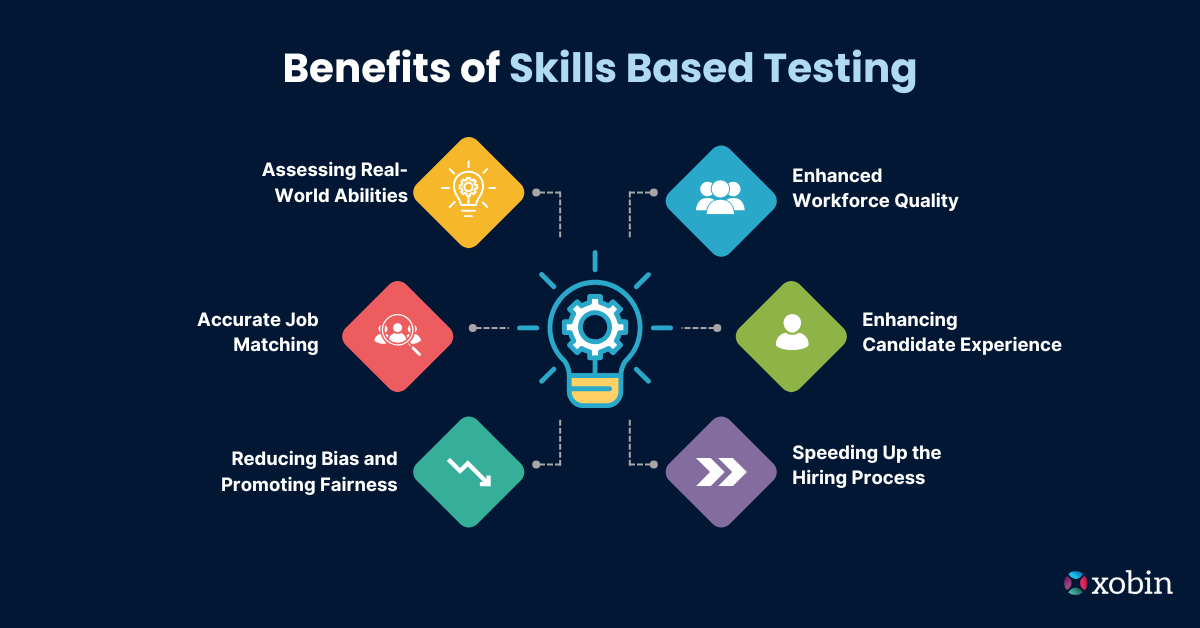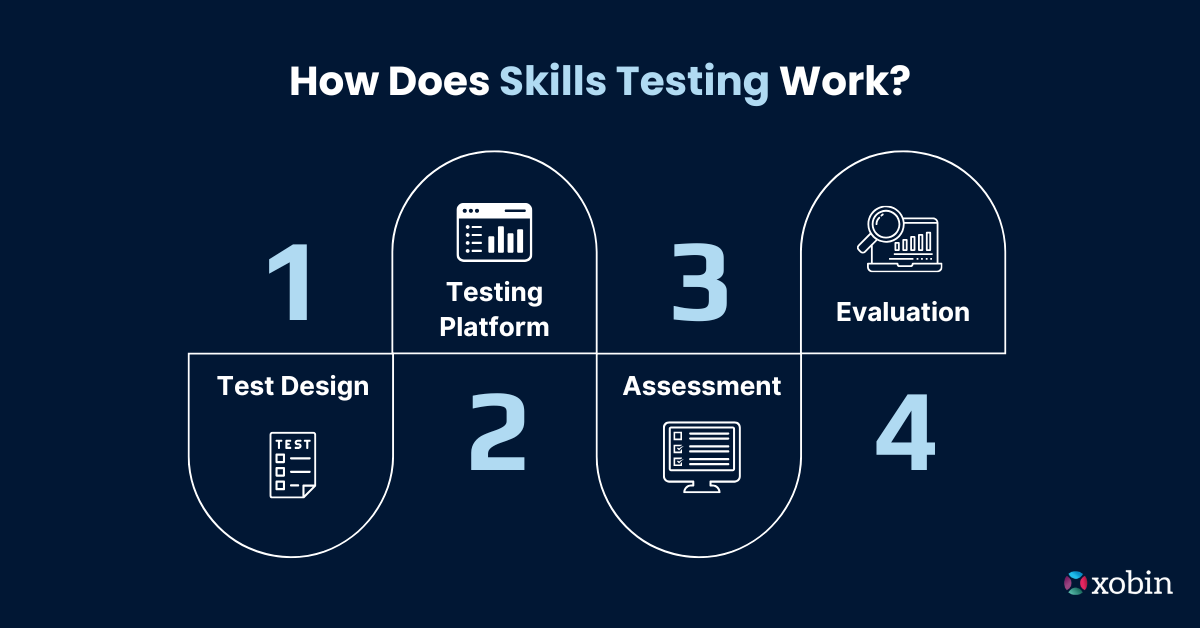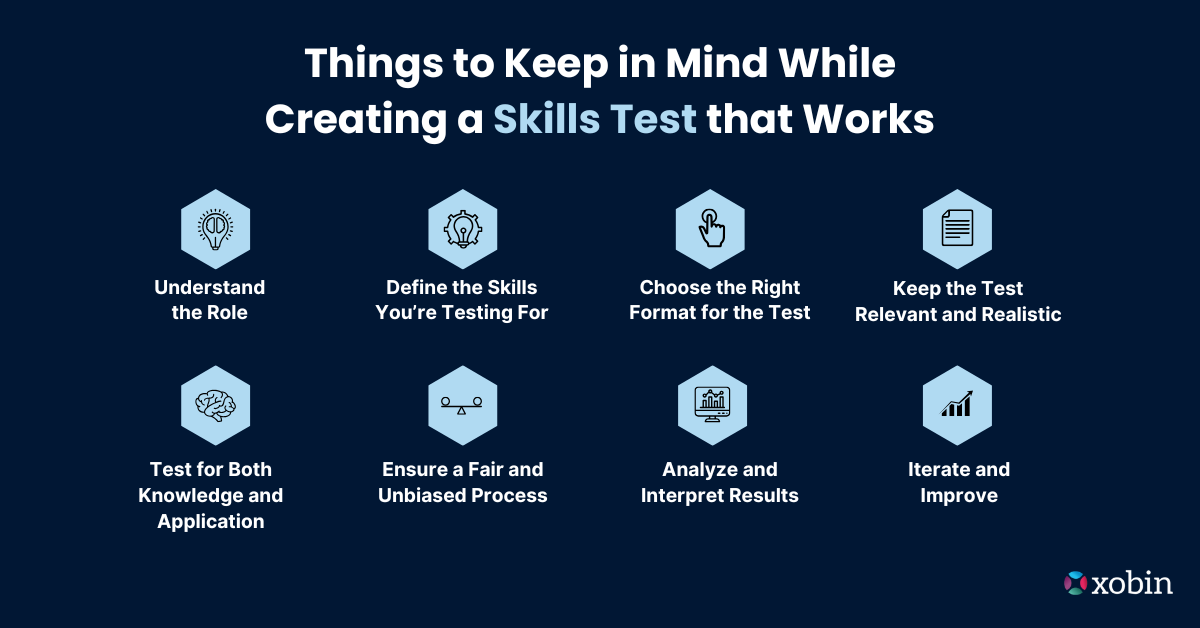Recruitment isn’t just about sorting resumes, it’s about finding the perfect candidate for the job. As a recruiter, you know that finding the right talent can be a daunting task. But how do you ensure that the person you hire is as skilled as their CV claims? One of the best ways to find this is using skills assessment tool. In this ultimate guide, we’ll walk you through everything you need to know about skills testing and how it can significantly improve your hiring process.
Table of Contents
What is Skills Testing?
Skills testing is a systematic evaluation method used by employers to assess a candidate’s proficiency, knowledge, and capabilities in specific areas relevant to a job role. These standardized assessments can take place in various forms, including online assessments, simulations, coding challenges, or performance-based tasks. It tests a candidate’s technical skills, soft skills, problem-solving skills, and job-specific competencies. Consequently, by implementing skills testing, recruiters can make more informed hiring decisions, identify skill gaps, ensure candidate qualifications match job requirements, and ultimately improve workforce productivity and performance.
Benefits of Skills Based Testing

One of the most effective ways to ensure you’re making the right hire is through pre-employment skills testing. So, what’s the purpose of these tests, and how can they benefit your organization? Let’s break it down:
1. Assessing Real-World Abilities
Skills testing removes the subjectivity that often comes with interviews or gut feelings. With a standardized test, you can objectively assess every candidate against the same criteria, ensuring fairness and consistency. This helps eliminate bias, making the recruitment process more equitable for all candidates.
2. Accurate Job Matching
When you use skills testing for employment, you can match candidates’ abilities with the actual demands of the role. This leads to more successful hires who can perform the required tasks without a lengthy training period. Ultimately, it reduces the risk of bad hires and turnover, which saves both time and money for your organization.
3. Reducing Bias and Promoting Fairness
One of the most significant advantages of skills testing is that it minimizes unconscious biases that may influence hiring decisions. Whether based on a candidate’s appearance, background, or the way they answer interview questions, bias can skew the process. You can ensure an inclusive and fair recruitment process when you focus purely on skill sets.
4. Speeding Up the Hiring Process
Recruiters have a lot to juggle, from reviewing resumes to conducting interviews. Skills testing streamlines the hiring process as it provides actionable insights instantly. Implementing pre-employment skills testing in the hiring cycle can quickly filter candidates and prioritize those who have the right skills. It saves you time, so you can spend more energy on your other tasks.
5. Enhancing Candidate Experience
Job seekers appreciate when companies use skills testing as part of the hiring process. It allows them to showcase their abilities in a tangible way and reduces the stress of traditional interviews. Moreover, candidates are more likely to feel respected and valued when they can demonstrate their skills rather than relying solely on how well they can answer hypothetical questions.
6. Enhanced Workforce Quality
Ultimately, the best benefit of skills testing is that it helps you build a stronger, more capable team. When you select candidates based on their abilities rather than their resumes alone, you’re setting up your company for long-term success. Moreover, employees who are hired based on proven skills are more likely to perform well, be productive, and contribute to a positive work environment.
Types of Skills Testing
When it comes to skills testing, there’s no one-size-fits-all. Different roles require different sets of abilities, and there are several types of skills tests that can assess these competencies. Let’s break down the most common types:
1. Technical Skills Testing
For positions that require specific technical knowledge, such as developers, engineers, or IT professionals, skills testing can evaluate practical technical skills. These tests typically involve coding challenges, troubleshooting scenarios, or system diagnostics. For example, if you are hiring a software developer you can use a software developer online test. In this test you may ask questions on programming languages, algorithms, data structures or a coding problem to solve using a specific programming language.
2. Cognitive Ability Testing
Cognitive ability tests are designed to assess a candidate’s mental capabilities, such as their problem-solving skills, logical reasoning, and general intelligence. They are especially useful for positions that demand quick thinking or complex decision-making. This type of skills testing may include puzzles, pattern recognition tasks, or abstract reasoning questions.
3. Soft Skills Testing
Soft skills or power skills, like communication, teamwork, and leadership, are often as important as technical abilities, if not more. Skills testing can evaluate how well candidates communicate ideas, collaborate with others, or adapt to changing environments. Role-playing exercises or situational judgment tests (SJTs) are great tools for assessing these power skills.
4. Skills-based Aptitude Testing
Aptitude tests focus on evaluating a candidate’s natural abilities or talents, such as numerical reasoning, verbal reasoning, and spatial awareness. These tests are often used to assess potential rather than prior experience, making them ideal for entry-level roles or candidates looking to switch to new fields. They can help you spot candidates who have the ability to learn and grow in a specific job role.
5. Personality and Behavior Testing
These tests aim to understand a candidate’s personality traits and behaviors. This type of skills testing measures qualities such as emotional intelligence, stress tolerance, and cultural fit. By assessing these factors, recruiters can determine whether a candidate will thrive in their team’s work environment.
6. Job Simulation-based Testing
The test mimics actual tasks or scenarios that a candidate would encounter on the job. These assessments provide a realistic preview of the candidate’s skills in action and can be incredibly effective in predicting job performance. For example, a marketing role might require a candidate to create a marketing campaign during a job simulation.
7. Role-Specific Skills Testing
Role-specific skills testing are tailored to the unique skills and requirements of a particular job. They may include tests for specific tools or methodologies, such as design software for graphic designers or customer relationship management (CRM) systems for sales teams. Therefore, using these assessments, recruiters can ensure that candidates possess the precise skills necessary for the role.
8. English Language Proficiency Testing
If you’re hiring for a role that requires English language fluency, you can use the communication checkers tool to assess English language proficiency. It can help determine a candidate’s ability to communicate effectively in the required language. This tool can assess, speaking, listening, writing, and comprehension skills, ensuring that candidates can communicate efficiently.
How Does Skills Testing Work?

Skills tests are typically delivered in an online format, where candidates complete various tasks or answer questions related to the job they’re applying for. These tests can be tailored to the specific role, industry, and even the company’s unique needs. Here’s a simple breakdown of how skills testing process works:
Test Design
You’ll first need to design the test. This could be a coding challenge, a writing test, a problem-solving task, or even a situational exercise. It’s important to align the test with the skills required for the position.
Testing Platform
Using an automated skills testing platform, can streamline the process. These platforms are designed to simulate real job scenarios, giving candidates a more authentic test while saving time and reducing biases in recruitment.
Assessment
Candidates complete the test, and the results are analyzed. The platform typically provides detailed insights into their performance, highlighting areas of strength and areas for improvement.
Evaluation
Based on the results, recruiters can assess whether a candidate is suitable for the job. This removes guesswork and ensures you’re hiring individuals who have the skills they claim to possess.
When to Use Skills Testing in the Recruitment Process?
Skills testing can be used at various stages throughout the hiring process, but it’s most effective when deployed at strategic points to maximize its value. Here are some key stages when recruiters should incorporate skill screening:
1. Initial Screening Stage
Once candidates submit their applications, skills testing can be used to quickly screen applicants and narrow down the pool. Rather than spending hours reviewing resumes, recruiters can use automated tests to assess core skills of the candidates. This helps identify whether a candidate meets the basic qualifications for the role, saving time and ensuring only qualified candidates move forward.
2. Post-interview Validation
Interviews are crucial for understanding a candidate’s personality, but they don’t always provide insight into their actual abilities. After the initial interview, a skills testing phase can help verify what candidates claim about their competencies. This is especially useful for roles where a candidate’s technical proficiency is essential.
3. Pre-Offer Stage
Some companies use skills testing as the final step before making an offer. It provides a final, objective assessment of a candidate’s abilities. As a result, ensuring you’re making the right choice, reducing the risk of making a bad hire.
Things to Keep in Mind While Creating a Skills Test that Works

Some companies use skills testing as the final step before making an offer. It provides a final, objective assessment of a candidate’s abilities. As a result, ensuring you’re making the right choice, reducing the risk of making a bad hire.
1. Understand the Role
Before creating a test, you need to have a solid grasp of the role you’re hiring for. What skills are absolutely necessary for success in that role? Do you need someone who can think critically and solve problems, or is it more about specific technical skills?
Start by reviewing the job description and talking to team leaders or hiring managers to pinpoint the skills that will make a candidate successful. The more specific you can get, the better your test will be at evaluating these skills.
Ask yourself:
- What core tasks will this person be doing daily?
- What tools and technologies will they use?
- What challenges might they face in this role?
The answers to these questions will form the foundation of your skills test.
2. Define the Skills You’re Testing For
When you know the role inside and out, it’s time to identify the exact skills you want to test. Here’s where things get specific:
- Hard Skills: These are the technical abilities like coding, data analysis, or machine operation. Hard skills are easy to test objectively, making them a core component of skills tests.
- Soft Skills: While a bit more subjective, skills like communication, leadership, and adaptability are just as important.
- Personality and Cognitive Skills: Some positions require certain personality traits or cognitive abilities.
You want to make sure the skills you test for are closely aligned with the requirements of the job.
3. Choose the Right Format for the Test
There’s no one-size-fits-all approach to skills testing. The format will depend on the nature of the job and the skills you’re evaluating:
- Multiple-Choice or True/False Questions: These are great for testing foundational knowledge.
- Practical Exercises: For more hands-on roles, have candidates complete tasks they’d face on the job. For example, if you’re hiring a graphic designer, you can use a graphic designer test to evaluate skills and knowledge of a candidate in graphic designing.
- Case Studies or Simulations: These can be especially useful for assessing problem-solving and decision-making skills.
Each format serves a purpose, so choose the one that aligns best with the role and the skills you’re testing.
4. Keep the Test Relevant and Realistic
One common mistake recruiters make is creating overly complex or unrealistic tests that don’t reflect the actual job. Remember, the goal is to mimic real-life challenges, not to test a candidate’s ability to memorize obscure facts. For instance, if you’re testing for a customer support role, simulate a scenario where the candidate has to handle a difficult customer. This will give you a far better idea of how they’ll perform in the real world than any multiple-choice question ever could.
5. Test for Both Knowledge and Application
Skills testing is about more than just knowledge—it’s about how candidates apply what they know. This is where the power of skills testing truly shines. Instead of simply asking theoretical questions, challenge candidates to demonstrate their skills in action. For example, instead of asking a candidate to list five features of Python, give them a problem that they have to solve using Python. Ultimately, this will better demonstrate their level of expertise and problem-solving ability.
6. Ensure a Fair and Unbiased Process
One of the most powerful aspects of skills testing is its ability to reduce bias. Unlike traditional interviews, where bias can unintentionally creep in, skills tests are objective. By using a standardized test for all candidates, you ensure everyone is evaluated on the same level playing field. Make sure your tests are structured, validated with psychometric properties and free from any unintentional bias. Additionally, it focuses on job-relevant criteria rather than subjective traits.
7. Analyze and Interpret Results
Once the candidate completes the tests, the real work begins—analyzing the results using actional reports. Look at both the quantitative and qualitative aspects of the candidate performance:
- Quantitative Results: These are the scores which give you a clear idea of how well candidates performed compared to each other.
- Qualitative Insights: Pay attention to how candidates approached tasks, whether they used innovative problem-solving techniques or struggled with certain aspects.
Both aspects are important in forming a holistic view of each candidate’s abilities.
8. Iterate and Improve
Finally, remember that skills testing isn’t a one-size-fits-all solution. It’s an ongoing process. After each hiring cycle, review how well your skills test evaluates the candidate. Did they identify the right candidates? Were there any flaws in the test design? Answers to these questions will help you refine and improve your skills testing process over time.
Use Xobin’s Skills Test to Hire Candidates 20x Faster while Saving 10x Time and Money
Making recruiting wiser, effective and ethical is the goal of Xobin, which goes beyond assessments. With Xobin you can,
- Gain access to more than 1,80,000+ Tech and Non-tech questions, 2,500+ job-role-based tests, and 3,400+ skills tests. You can also create your own tests using your own questions.
- Get 100% test integrity with the help of advanced proctoring features like AI-based proctoring, browser monitoring, screen recording, off-tab activity tracking, etc.
- Access advanced, actionable reports to help you make informed decisions.
The process of selecting the best candidates does not have to be an impossible task. You can leverage Xobin to make data-driven decisions and build a skilled team. Discover which skills test you require to hire the best candidates by looking through our vast skills inventory.
Are you looking to hire the top talents? Book a personalized demo today to experience the future of recruitment!






